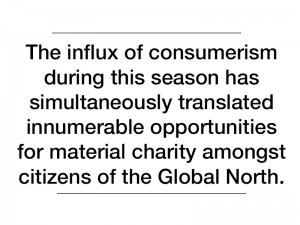Each year, SGA pairs with the Houghton Wesleyan church to take part in “Operation Christmas Child.” For the past two years, I have taken the role of coordinator as SGA Chaplain.
When I first started the event, it seemed so simple. We packed boxes, celebrated our numbers, sent them off in big trucks, and then waited to hear stories of kids opening these boxes. It was such a simple equation. “A” plus “B” equaled “C.”

However, as I began to grow deeper in my understanding of international development, everything suddenly turned gray. I found myself asking questions such as,“How sustainable is their methodology?” or “Is this destructive to other cultures, especially non-westernized ones?” These are some of the questions I want to attempt to address.
Let’s first lay out context on the organization.
Operation Christmas Child (OCC) was originally started by Dave and Jill Cook in the United Kingdom in 1990, but later merged in partnership with Samaritan’s Purse in 1993. According to their website, their mission is to “provide local partners around the world with shoeboxes filled with small toys, hygiene items, and school supplies as a means of reaching out to children in their own communities with the Good News of Jesus Christ.” They are based in 150 countries, including Native American reservations here in the United States.
Now that we have context, let’s start the analysis. There are two issues I want address: proselytization and Westernization.
First, proselytizing. To proselytize means to “induce someone to convert to one’s faith from another.” Unlike the word “witnessing,” proselytization carries negative connotation of “force,” “against will,” or “unwanted.” Bryant Myers put it well in his book, Walking with the Poor. He says, “Our thinking and practice of transforming development must have evangelistic intent…though this is not a call for proselytism; neither is it a call to coercive, manipulative, or culturally insensitive evangelism…rather, it is a call to be sure we do our development with an attitude that prays and yearns for people to know Jesus Christ.” So does OCC fall on the witnessing side or the proselytizing side?
To be honest, I came into this argument quite skeptically, thinking that their Greatest Journey program was a form of proselytization; however, after some research, I found that OCC explicitly addressed my question and titled it “Is this forcing religion on the child who gets a gift?” In their statement, they openly addressed that, saying, “children do not have to do or say anything to receive their gifts.” So if we are to take them by their word, I believe it would be thus unfair to label them as proselytizers.
 Second, westernizing. In the development world, this word carries a great deal of controversy. The thought of “white saviors” coming into non-Western cultures and giving them Western toys, laced with messages of “the West is best” is quite controversial. It is also argued to be a form of post-colonialism aid that reinforces other cultures’ need for the Western white world to fix their problems. However, this line grows gray. For one, the organization states that they pair with local churches in attempt to initiate a “bottom-up” approach. Secondly, half of their ministry is in already Westernized countries. For instance, Houghton student Elizabeth Clark ’18, recalls her experience receiving an OCC box as a child in Estonia. She remembers it as a nice gesture, though nothing out of the ordinary, since her family was used to getting present on Christmas. But, “to have something nice…or something that won’t break in five minutes…makes a child feel loved, cherished and important.”
Second, westernizing. In the development world, this word carries a great deal of controversy. The thought of “white saviors” coming into non-Western cultures and giving them Western toys, laced with messages of “the West is best” is quite controversial. It is also argued to be a form of post-colonialism aid that reinforces other cultures’ need for the Western white world to fix their problems. However, this line grows gray. For one, the organization states that they pair with local churches in attempt to initiate a “bottom-up” approach. Secondly, half of their ministry is in already Westernized countries. For instance, Houghton student Elizabeth Clark ’18, recalls her experience receiving an OCC box as a child in Estonia. She remembers it as a nice gesture, though nothing out of the ordinary, since her family was used to getting present on Christmas. But, “to have something nice…or something that won’t break in five minutes…makes a child feel loved, cherished and important.”
So where do we go from here? I admit, I’m still wrestling, debating, and engaging with these issues daily. But my desire today is not to provide any answers to you, but rather to ignite a prompting in your heart to critically analyze and engage with the grays in this world. It is easy to point out flaws and mistakes, or on the other side, give a blind eye and neglect any wrongs; but to engage the gray is hard. But there is also beauty in gray. I used to always pray for God to give me black and white answers on everything. However, I’m finally starting to see that the gray not only forces me to engage both sides, but it also stands as a beautiful reminder of my complete and total need for God. So wherever you stand, try to step back and try and engage the gray. Who knows, maybe it is through that engagement that you will find the answer you were looking for.
Melissa is a senior majoring in communication and international development.

